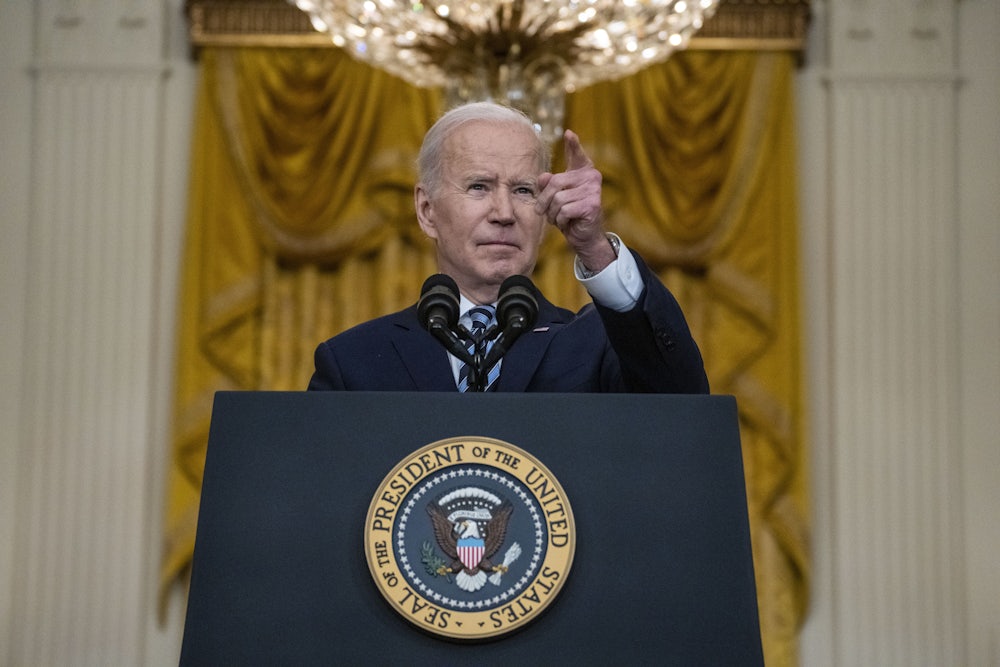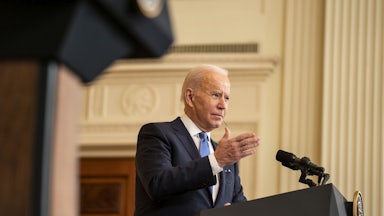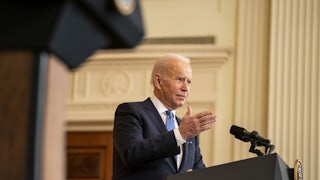As President Joe Biden prepares to deliver his second State of the Union address, his approval ratings have never been lower, and his presidency has never looked better.
One month ago, Biden’s lousy approval rating (41.7 percent, according to FiveThirtyEight’s average) made a certain rough sense. Omicron was raging, inflation was spiking, and Biden had been suckered by Senator Joe Manchin into thinking he might support some version of the Build Back Better bill. Biden’s terrible approval numbers didn’t make complete sense, because, apart from inflation, the economy was robust, with gross domestic product growth of 5.7 percent in 2021. But Covid deaths were higher than they’d been for a year and still climbing. For the past two years, everything has been about Covid-19.
Today, everything is still mostly about Covid, but Covid deaths have been falling for the past month and Covid cases are lower than they’ve been since last summer. Inflation is likely getting worse—Brent crude rose today above $106 per barrel—but the world is starting to reopen. And Biden is thinking practically about resurrecting whatever parts of the Build Back Better bill he can without calling it that.
Yet Biden’s approval rating is slightly worse (41.1 percent) than it was a month ago. That makes no sense at all. In a USA Today poll released Monday, a 51 percent majority said that the economy was in a recession or a depression. It isn’t! The people have spoken, and the people couldn’t be more wrong.
What’s most striking right now is how well Biden is handling the Ukraine crisis. It’s received little acknowledgment in news coverage because the press never likes to contradict a president’s approval numbers. It’s considered biased, or perhaps just bad manners, to say a president is performing well when polls say he’s performing poorly. But public opinion is often wrong, and right now it’s wrong to an unusual degree. Even pollsters are baffled by it. Although I’d never be so rash as to predict a turnaround in a president’s approval numbers, should one occur in the next week or so I won’t be surprised.
Some have acknowledged grudgingly that Biden has been handling the Ukraine crisis much better than Trump ever would have. That’s a low bar. George W. Bush, the worst twenty-first-century president until Trump came along, would be handling the Ukraine crisis much better than Trump. Biden is addressing the Ukraine crisis with extreme skill. He is dealing with it better than I can recall President Barack Obama or President Bill Clinton dealing with any foreign crisis.
The first inkling was Biden’s novel use of intelligence to wage an information war against Putin in the run-up to the invasion. This was very much a departure from the past practice of keeping such intelligence secret in the interest of protecting sources of information. Even Biden’s apparent blunder when he said he thought a Russian invasion was inevitable—read by many as an invitation for Putin to proceed—may have served to delay it. “Biden has given Putin a brilliant off-ramp,” tweeted Michael McFaul, U.S. ambassador to Russia during the Obama administration. “By announcing to the world that Putin plans to invade, Putin can now embarrass Biden by not invading and blaming the West for beating the ‘drums of war.’”
Obviously, Putin did proceed with his invasion, so McFaul’s “off-ramp” theory was faulty. But writing for the Voice of America (which I imagine thinks about information warfare more than the rest of us), Jamie Dettmer reported that earlier predictions by U.S. and British officials that the invasion would start on February 15 jangled Russian officials sufficiently that they accused the West of fomenting “hysteria.” It isn’t unreasonable to conclude that talking up the imminence of the invasion delayed it. At the very least, it surely must have made Putin wonder where such intelligence was coming from. As David Ignatius wrote in The Washington Post, “Heads must be spinning in the Kremlin—and perhaps rolling, too—as Russian President Vladimir Putin sees his state secrets broadcast on nightly news.”
The United States and NATO have also, as one U.N. official told VOA, “been quick to counter Russian disinformation.” Probably the best example was when U.S. intelligence uncovered a Russian plan to use staged video of a Ukrainian attack to justify its pending invasion. The State Department was only too happy to talk about it. Spokesman Ned Price called it “one of a number of options that the Russian government is developing as a fake pretext to initiate and potentially justify military aggression against Ukraine.”
Whatever delays Biden accomplished through this strategy likely helped win strong backing in the European Union for imposing economic sanctions against Russia. As I wrote yesterday, these have proved much more damaging than most people expected. “Never before,” reported CNN’s Charles Riley on Tuesday, “has an economy with the global importance of Russia’s been targeted with sanctions at this level, according to analysts, who say there is now a high risk that Russia will face a financial crisis that pushes its largest banks to the brink of collapse.”
A third area where Biden has performed well in this crisis has been his response to Putin’s attempt to escalate nuclear tensions. After the U.S. and the EU announced Saturday that they were targeting Russia’s central bank and removing certain Russian banks from the SWIFT financial messaging system, Putin put his nuclear forces on high alert. Biden responded with a shrug, and his administration put out the word that Putin was behaving irresponsibly. You probably have to go back to George H.W. Bush to find a president with sufficient confidence to recognize this as the necessary move.
Republicans are trying to portray Biden as weak in allowing the invasion to happen. But no one in his right mind believes the U.S. had military options, and besides, these are the same people who last week were parroting former President Donald Trump’s line that Putin’s invasion was laudable. Trump is still saying it—on Sunday he told the Conservative Political Action Committee, “Putin is playing Biden like a drum”—but not many Republicans are willing anymore to repeat it. On Sunday, George Stephanopoulos made great sport of Republican Senator Tom Cotton’s refusal to say what he thought of Trump’s pro-Putin stance.
I’m surprised by how little notice liberals and the left have given Biden’s strong performance on Ukraine. Thus far, what little praise I see is coming is from Never Trumpers. Jonathan V. Last, editor of The Bulwark, wrote on Monday:
Biden did not draw lines in the sand. He did not personalize the conflict. He did not turn himself into the star of the show. He did not allow anyone, anywhere, to believe that this was about America.
Exactly. Bill Kristol tweeted the same day:
President Biden’s leadership in the Ukraine crisis has been truly impressive, we’re coming out of the pandemic at last, and we have a fine Supreme Court nominee. So Democrats are carping at what hasn’t been done and liberals are indulging in fatalistic navel-gazing.
I can’t argue with that.
An exception is my friend the journalist and onetime Carter speechwriter James Fallows, who after I tweeted yesterday that Biden’s successful handling of the Ukraine crisis was a “little-told story,” answered:
Success as president requires more abilities than any one person has ever had. (Stamina/IQ/EQ/small-group charm/large-crowd eloquence/historical knowledge/future vision/luck)
But if you had to choose a single crucial quality, it would be *temperament*
Which Biden has.
Biden could still blow it. This crisis doesn’t seem likely to end quickly, and many decisions lie ahead. But as he prepares to deliver the State of the Union address, Biden is looking unexpectedly confident and strong to anyone who’s paying serious attention. He should send Putin a thank-you note.










